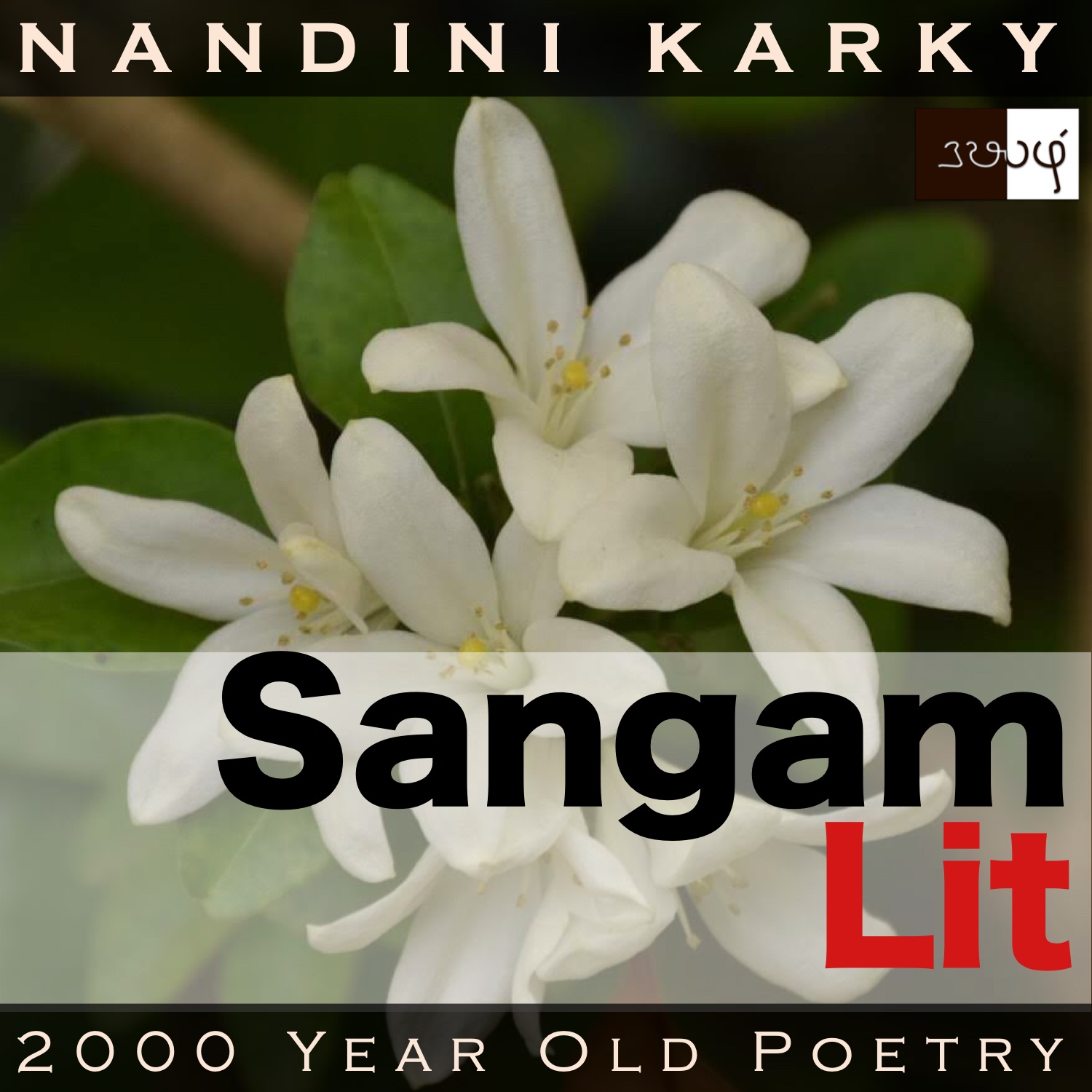Podcast: Play in new window | Download
Subscribe: Apple Podcasts | Spotify | Amazon Music | Android | iHeartRadio | TuneIn | RSS | More

In this episode, we glean facts about history and a household, as depicted in Sangam Literary work, Kurunthogai 19, penned by Paranar. Set in the agricultural regions of ‘Marutham’, the verse speaks in the voice of the man to his heart, lamenting about the lack of forgiveness from the lady.
எவ்வி இழந்த வறுமையாழ்ப் பாணர்
பூ இல் வறுந்தலை போலப் புல்லென்று
இனைமதி வாழியர்-நெஞ்சே!-மனை மரத்து
எல்லுறும் மௌவல் நாறும்
பல் இருங் கூந்தல் யாரளோ நமக்கே?
Emptiness envelopes this verse, from head to toe! The opening words talk about a historical person named ‘Evvi’ and how ‘the loss of this person led to poverty amidst the bards of those times’ in ‘எவ்வி இழந்த வறுமையாழ்ப் பாணர்’. More about ‘Evvi’ soon! ‘பூ இல் வறுந்தலை’ meaning ‘a bare head without flowers’ intrigues us, for it seems to hint that the ancients expected a head to be adorned with flowers, perhaps like how our reference to a ‘naked’ person implies the expectation that a person covers themselves with clothes normally. A radiant image delights us in ‘மனை மரத்து எல்லுறும் மௌவல்’ meaning ‘the white jasmine flowers that bloom so brilliantly on the tree in the house’ and makes us gaze at a tall jasmine tree, that seems to have been a fixture in Sangam homes. Ending with ‘யாரளோ நமக்கே’ meaning ‘who may she be, to us?’, the verse highlights the nuance of how the man saw his heart and himself as separate entities in his usage of the plural pronoun ‘us’ and makes us wonder about the lady in question as well.
What a strange question this man asks about his lady! The context reveals that the man and lady had been in a married relationship when the man left her for a while, as he chose to keep the company of courtesans. However, he soon realised the mistake in his ways and returned home. Even though he tried to placate the lady in many ways, she seemed to harbour resent in her heart and continued to sulk with him. One day, the man turns to his heart and says, “Grieve listlessly, O heart, akin to bards’ heads, shorn of flowers, whose lutes have fallen into poverty, having lost the grace of king Evvi. May you live long! This lady, whose thick, black tresses waft with the scent of radiant white jasmine flowers from the house tree – who could she be, to me?” With these words, the man expresses the anguish in his heart at not being accepted by the lady, even after the expression of regret over his prior activities.
Guilt and forgiveness seem to be at play here! In the first part of the verse, the man talks about the plight of bards, who seem to have stopped playing their lutes and appear with barren heads, without any flowers. To the question, what reduced them thus, the man says the reason for their impoverished state is the loss of a king name ‘Evvi’. Many Sangam poems describe this ‘under king’, the chief of a small region, and mention about his generosity to artists and seekers. One poem describes how the bards broke their lutes on hearing about this death, such was his patronage to them. Some accounts also indicate ‘flowers for the bard’s head’ refers to ‘golden flowers’ given as gift by ‘Evvi’ to musicians for their work. Returning to the verse, we see that the man has mentioned these events from history to compare the listlessness of those bards and his own heart at the current moment. When we ask him with concern why such a sad state, the man reveals that the lady who wears the radiant white jasmine flowers from his home on her thick tresses seemed to act akin to a stranger to him, her husband!
Hope that the man found some relief in his expression but the right thing his heart may whisper to him in response, if it’s wise, would be ‘give her more time’. The verse turns the focus on the innately difficult emotional stages of regret, approach, acceptance and forgiveness. An expectation of a seamless and instantaneous flow between these stages would only result in disappointment, like our man in the verse. But with time, with patience, and with perception of the sincerity in the other’s regret, there is every chance of hearts melting and strangers becoming beloved once again!




Share your thoughts...